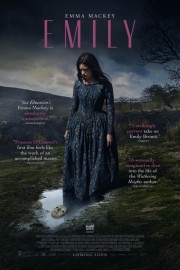Emily
Period dramas like “Emily” hope to entertain us, as well as enlighten us on their subject. There’s not a lot in Frances O’Connor’s film that distinguishes it from other biopics of its ilk, but the way she builds this film, as it sheds light on the life of Emily Brontë, and what inspired her to write her beloved novel, Wuthering Heights. Though inspired by Brontë’s life, it does take liberties, and inspiration from the real Brontë’s solitary nature to explore what it is like to have a forbidden love, to lose that love, and to create through what that love inspires. As anchored by a performance by Emma Mackay as the author, this film keeps ahold of us, even if it feels as though it meanders at times along its 130 minute running time.
The film begins with Emily in her death bed, being looked over by her oldest sister, Charlotte (Alexandra Dowling), who wants to know what inspired her to write Wuthering Heights. We then turn to the past, and Emily, her sisters, and her brother’s lives with their father (Adrian Dunbar). Emily is the outsider of the family, not necessarily interested in the typical things women are supposed to be interested in at the time; she hopes to continue building out the world she created with Charlotte. When their church gets a new curate in William Weightman (Oliver Jackson-Cohen), Emily is dismissive, but as they begin to know one another, it opens something up to her.
A key moment is when they are playing a game involving a mask, and Emily claims to be possessed by the children’s deceased mother. It leaves everyone involved rattled, but it reveals a lot about what haunts Emily as an individual. Did it happen? Possibly, but even if it didn’t, it accentuates the haunted nature of her writing and personality in a way that makes us feel closer to her, and it plays into much of what we see of her moving forward in the film. O’Connor is interested in creating a world around this character that would inspire something like Wuthering Heights, and while I don’t know that I think she does anything extraordinary in doing so, I think her use of light (by way of cinematographer Nanu Segal), music (Abel Korzeniowski’s score is both very familiar and uniquely compelling), and production design (by Steve Summersgill) is worth considering when comparing this film to other period romances we might think about along the way. There are strong performances and great set pieces (the scene with the mask, when Emily and her brother get caught doing something they shouldn’t), and some strong signs of O’Connor as a director worth keeping an eye on moving forward.










